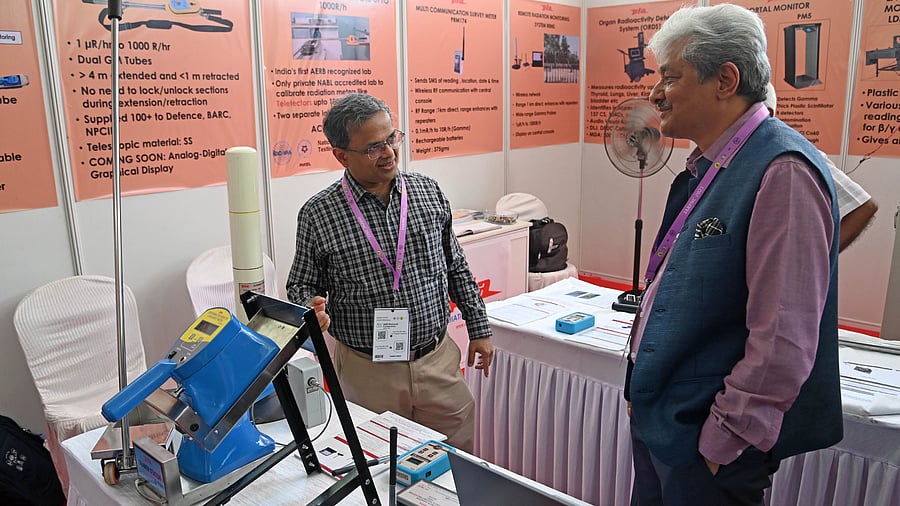
Atomic Energy Regulatory Board (AERB) Chairman D K Shukla having a look at the trade exhibition held as a part of 35th Indian Association for Radiation Protection (IARP) national conference , at Mangalore University campus, Mangalagangothri on Wednesday.
DH Photo
Mangaluru: Atomic Energy Regulatory Board (AERB) Chairman D K Shukla said that the delegates of the conference working in the radiation field should ponder over developing a national registry for radiation exposure in the medical field.
Speaking on the sidelines of 35th Indian Association for Radiation Protection (IARP) national conference on Wednesday, he said there are radiation exposure dose limit for the occupational workers working in nuclear plants that is being monitored. However, data for those operating CT machine, X ray and others radiation-related equipment in the medical field needs close tracking too, he added.
The conference on radiation protection for sustainable nuclear energy was organised by the Mangalore University in association with Indian Association for radiation protection (IARP).
There is also a dose limit for the public, which is much, much less. The National Occupational Dose Registry System (NODRS) is maintaining and updating annual and lifetime dose data of all monitored radiation workers. The scope of NODRS however needs to be expanded to cover all.
“There is an issue of radiation exposure in medical field. The exposure in X Ray, CT Scan is much higher than what you get through the power plant. But we do not have a system where this is integrated. When a patient consults a doctor, how will that doctor know how much dose of radiation he/she has already received through scans? The conference should look into how we can integrate this and make recommendations to the government through the Department of Atomic Energy and Health Ministry,” Shukla said.
Inaugurating the conference, he said if radiation protection is applied well, then it will contribute to the sustainable development of nuclear energy. If applied poorly, it will do more harm than good. Appropriate level of protection without adversely affecting sustainable development of nuclear energy is the need of the hour.
Shukla stressed the need for research in low dose radiation on health by mechanistic laboratory studies complemented by epidemiology studies, integration of all relevant inputs and making available the data for public scrutiny. There is a need to create public awareness on the nuclear plants to overcome public fear.
Kaiga Generating Station Site Director B Vinod Kumar said today India operates 24 nuclear reactors with an installed capacity of 8,180 MW. Additional 11 reactors are under construction with a combined capacity of 8,700 MW. The world has concluded that contributions from nuclear power needs to be raised to contest climate change, by keeping the rise in global temperature below 1.5°C. This only can replace fossil fuel plants and produce electricity on a large scale.
The initiative of Net Zero Nuclear (NZN) calls for unprecedented collaboration between government and industry leaders to at least triple global nuclear capacity to achieve carbon neutrality by 2050.
India's nuclear power sector is saving 41 million tonnes of carbon dioxide emissions annually, compared to emissions that would have been generated by equivalent electricity generation from coal-based thermal power plants. India is committed to achieve a net zero emission target by 2070 as announced by the Prime Minister at the 26th session of conference of parties to the UN framework convention on climate change held at Glasgow, UK in November, 2021.
In this regard India has initiated steps to increase the share of nuclear power capacity. The growth of the Indian Nuclear Power Programme is imperative to meet the twin goals of energy security and sustainable development, he added.
Former VC of Bengaluru University Prof K Siddappa, Yenepoya Deemed to be University VC Prof M Vijaykumar, Registrar Raju Mogaveera and others were present.
IARP awards were conferred on the occasion. IARP Life Time Achievement Award 2025 was conferred on Dr K S Pradeepkumar.